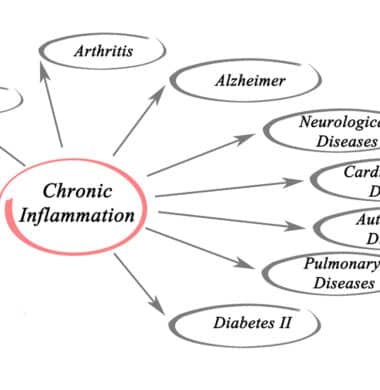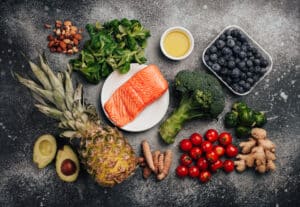Chronic Low-Grade Inflammation: What Is It, and What Foods Can Help?

There are two types of body inflammation, acute and chronic. Acute inflammation is a normal response from our immune system. Acute inflammation can include pain, redness, and swelling at the site of an injury. The acute inflammation subsides as healing takes place. Acute inflammation also includes our body’s immune response to bacteria and viruses. These invaders cause damage to our cells, which then triggers a release of chemicals.
These chemicals trigger immune cells, such as macrophages or neutrophils, to respond. These immune cells work on the bacteria and viruses to make us well again.
Chronic inflammation comes in two forms. Chronic inflammation is caused by autoimmune disease and unhealthy lifestyle choices. With autoimmune disorders, genetic anomalies cause the body’s immune system to attack cells constantly. Some of these diseases include Lupus, Crohn’s disease, fibromyalgia, and multiple sclerosis. However, some autoimmune diseases are thought to be caused by a combination of factors. Unhealthy lifestyle choices can cause low-grade chronic inflammation. This type of inflammation can progress without symptoms; however, it is the cause of many chronic diseases. These diseases include cardiovascular disease, type 2 diabetes, non-alcoholic fatty liver disease, and Alzheimer’s disease.
What We Know About Anti-Inflammatory Foods
Research is growing in this area. Most of the research has been done on individual compounds and nutrients in a laboratory setting. These studies are a good starting point; however, more research is needed.
A relatively recent study by the Journal of the American College of Cardiology (JACC) followed 200,000 participants over 30 years. They found that participants who followed a pro-inflammatory diet were associated with a higher cardiovascular risk. Other research identifies specific dietary patterns are associated with lower levels of inflammation, specifically the Mediterranean diet and portfolio diet.
These studies used the Dietary Inflammatory Index (DII) and the Empirical Dietary Inflammatory Pattern (EDIP). These tools are used in research to evaluate a diet’s anti-inflammatory or pro-inflammatory properties. The DII score is based on 45 different nutrients and compounds that seem to have anti or pro-inflammatory properties. The EDIP is based on 18 different food groups. The EDIP food listed contains half anti and half pro-inflammatory foods.
Some foods to avoid that have high pro-inflammatory potential are:
- Red meat, processed meat, hot dogs, lunch, and cured meats.
- Refined carbohydrates and sweetened beverages such as white bread, white pasta, and soda.
- Snack foods like chips, crackers, and pastries.
- Alcohol
How to Create an Anti-Inflammatory Diet

The compounds and nutrients that seem to have anti-inflammatory properties* are:
- Various fruits and vegetables contain compounds and nutrients that seem to be anti-inflammatory:
- Anthocyanins – purple and dark-colored fruits and vegetables like black plum, all berries, red/purple cabbage, red onions, black beans, and black rice.*
- Beta-Carotene – yellow, orange, and green leafy fruits and vegetables such as carrots, spinach, sweet potatoes, cantaloupe, and apricots.*
- Flavan-3-ols is in tea, apples, pears, berries, and cocoa products.*
- Flavonols – capers, curly kale, broccoli, and leeks.*
- Isoflavones – soybeans and soy products.*
- Vitamin C – red peppers, oranges, kiwi fruit, green peppers, and Brussels sprouts.*
- Teas, herbs, and spices*
- Dried teas such as chamomile, green, black, and oolong teas
- Ginger, garlic, turmeric, saffron, pepper, parsley, fenugreek seed, oregano, rosemary, and sage.
- Fiber*
- Beans/legumes, whole grains, artichoke hearts, barley, and oats
- Omega 3s
- Salmon, tuna, mackerel
A one-day anti-inflammatory meal plan:
Breakfast:
- Egg Salad Avocado Toast
- 1 cup of cherries
Mid-morning snack:
- ¾ cup of fat free Greek yogurt
- ¼ cup berries
Lunch:
Mid-afternoon snack:
- ¼ cup of dry roasted almond
- 3 dried apricots
Dinner:
*This is not an all-inclusive list.
https://www.ncbi.nlm.nih.gov/pmc/articles/PMC6214864/
https://www.ncbi.nlm.nih.gov/books/NBK493173/
https://karencollinsnutrition.com/inflammation-how-to-measure-it-how-to-reduce-it/
https://www.sciencedirect.com/science/article/pii/S003306201830094X?via%3Dihub
https://www.sciencedirect.com/science/article/abs/pii/S0271531716000506?via%3Dihub
https://jn.nutrition.org/article/S0022-3166(22)10824-2/fulltext
https://www.myfooddata.com/articles/natural-food-sources-of-beta-carotene.php
https://nutrition.org/are-you-getting-enough-flavan-3-ols/#:~:text=Flavan%2D3%2Dols%20are%20commonly,%2C%20chocolate%2C%20and%20cocoa%20products
https://www.ncbi.nlm.nih.gov/pmc/articles/PMC5421117/
https://www.tuscany-diet.net/2014/03/04/flavonols/
https://ods.od.nih.gov/factsheets/VitaminC-HealthProfessional/#:~:text=Fruits%20and%20vegetables%20are%20the,the%20American%20diet%20%5B8%5D
Blog written by South Denver Cardiology Registered Dietitian, Jennifer Leone, RDN
- Are There Special Considerations When Pregnant with a Heart Condition? - July 14, 2025
- Does Vaping Increase Your Risk of Heart Disease? - July 7, 2025
- Lifestyle Factors That Increase Your Risk of Heart Disease - May 26, 2025
Sign Up
As with any health concerns, your specific treatment program should be discussed thoroughly with your primary care physician as well as any specialists who may need to be consulted – like a cardiologist.
Sign Up
